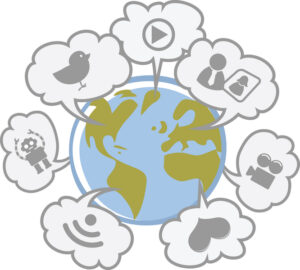I can’t remember the last time I wrote about technology’s creation of global audiences and how this will affect our industry. Today I received another notice from clicking on a New York Times article link: You have reached your 10 article per month limit, subscribe to view.
Can you imagine needing to subscribe to all the newspapers that are online in order to get the full news of your world? Researchers, like myself, will have to create a big line item in their budgets to make this happen if every newspaper online is switching to this format. I understand the need to monetize, however, with global audiences, this is going to create more problems down the road.
This mentality is beginning to happen in the arts as well. We have several arts organizations and artists performing online now, and everyone is going to want to monetize. There are several organizations that are doing the movie theater and/or sports stadium broadcasts now. These types of presentations will build a more global audience. What does this type of offering do to the local little guy? If people can buy tickets to see a production by The Metropolitan Opera, will they also buy tickets to the local opera company’s productions? If you can view the Berlin Philharmonic online, will you want to see the local orchestra too? Theatres are starting to go global as well. How will this effect local, live performance sales? And, don’t get me started on what is happening with museums bringing collections online. Talk about huge changes coming!
A while back, I predicted this would happen to the point that the bigger organizations may drown out the smaller ones due to the global nature of their performances. I did not like making this prediction, but it seems to be happening. If I have to choose between the New York Times and my local paper in order to get the best news on the arts, well, I probably will be forced to choose the New York Times. I won’t be able to subscribe to everything that is demanding payment to view.
We will be forced to pick and choose. This goes hand in hand with our economy and the fact that people are choosing more carefully. I wish I had the money for everything, but I don’t, so I have to choose. Quality, value, reputation, quantity, all of these factors will be a part of our decisions. Every organization, big and small, is trying to survive and thrive. Will the little guy stand a chance next to The New York Times and The Metropolitan Operas of the world?
Yes, again, of the world. Now that we can have a global presence, this is going to get extremely complicated. If you had a choice to see a Shakespeare production of The Globe Theatre via a live broadcast vs. a local Shakespeare production, what would you choose? Unless you were a loyal audience member to your local theatre company and see the value of real live theatre, be honest, you probably would choose The Globe.
Yet, think about what I just wrote. Unless you were a loyal audience member to your local… Aha! A potential solution! Dare I say it? I dare…Audience Development!
We are now in the age of global competition. The bigger, well established, highly respected arts offerings are now your competition. This can be a really scary thought, and it presents new challenges that were not there before. The only way you can compete is if you have fantastic audience development and your audiences become happy and loyal to you and your art. This is how you can remain in the global game.
In the near future, I will be writing a huge post about audience development – what it is to the core of what I believe it can do for us. There has been much debate about what it truly is, and I find that in the transport from the UK/Canada, Americans have mistranslated this term through our American lens. Getting to know what audience development really is I think will help us in this global environment that is closing in on us faster than you can say audience development. It’s happening now, and we must prepare for it.
Getting back to the newspaper example, perhaps there could be a push for an online pass that covers all online newspapers. Pay once to view all! Eliminate the competition factor. Yet, I have a feeling this is a pie in the sky idea. Having a big industry agree on something of this nature probably will not happen. Everyone will want a fair share and the ability to grow, which an agreement of this nature may not allow.
The arts have a similar situation. Time will tell which giants might take over the world and which little guys will remain in the game from their due diligence of audience development. Are you preparing?
Cheers to happy and loyal audiences,
Shoshana
Shoshana Fanizza
Chief Audience Builder





